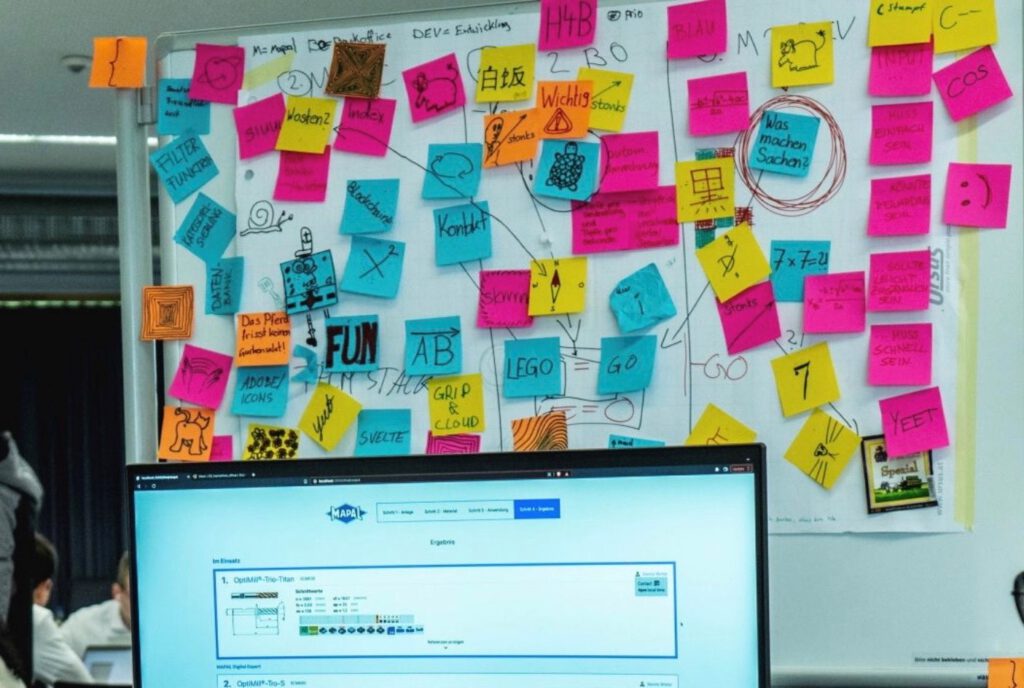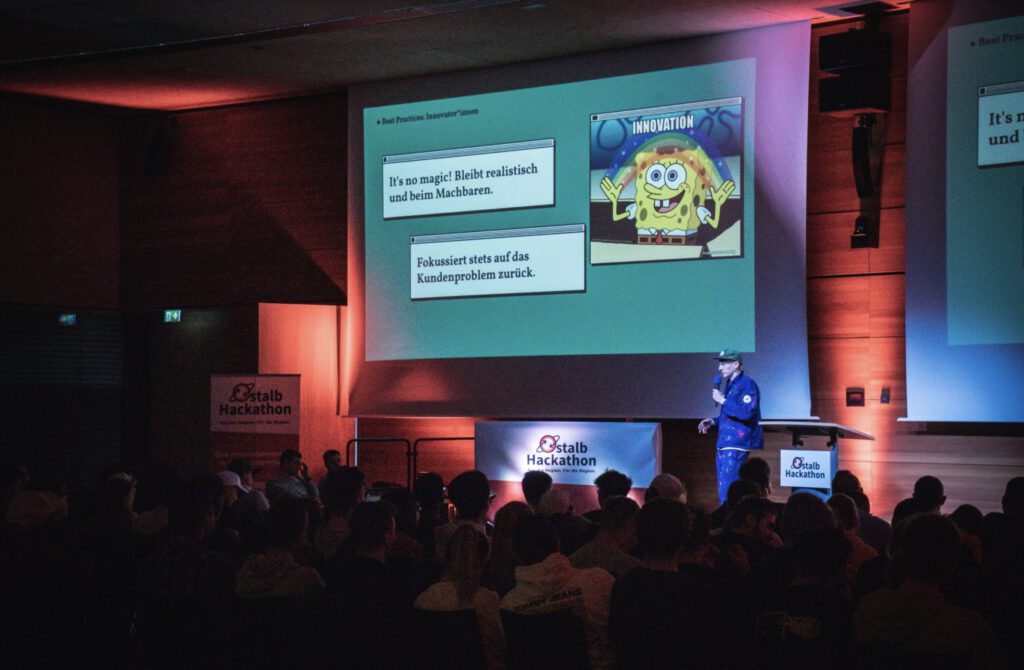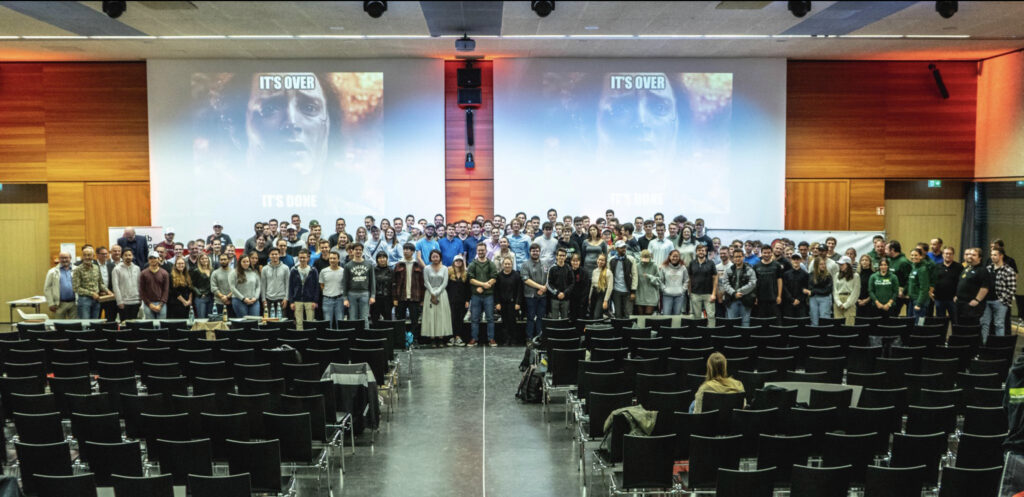This article is a guest article from Maximilian Brenner
Table of Contents
Introduction
Imagine you have 48 hours to find, implement and present a solution for a complex problem. In return you get sleep deprivation and maybe some money.
A hackathon does not sound appealing at first. Nevertheless I have taken several of these competitions and now I want to share my experiences.
I want to show you why such an event can be fun and who it might be suited for.
What is a hackathon anyway?
As mentioned in the beginning, a hackathon is an event that lasts roughly two days and two nights. Companies present a problem which has to be solved by the teams.
After getting to know each other and some other organizational points, there are 48 hours to come up a solution and implement it.
The term hackathon is made up of the words hacking and marathon. Hacking simply describes finding a creative and unconventional solution to a problem aside from the normal way.
Well, and a marathon is simply a sporting event where you run for a long time 😀
My hackathon

The schedule of one of the hackathons I participated in was as following. First there was the “getting to know each other”. You talk to different people, get to know possible team members or learn something about the challenges.
Especially the aspect of getting to know team members was very important, because not many people participated with a complete team, instead they got together shortly before the start.
After that, the organizational part followed. It was explained how everything works. The most interesting part was the challenge pitches in which the problems which have to be solved are explained for the first time.
As soon as that was done, we went into the Challenge Deep Dive, where we got detailed information about the challenge, as well as the opportunity to ask questions. Then the hacking started, open end of course.
On the 2nd day, there were two deep dive sessions in addition to the hacking sessions. There was also a pitch training for the ideal presentation and in the evening a Campfire Talk followed by networking time. On the 3rd day we had the
morning to prepare the presentation. After lunch the pitches began in which the teams had to present their idea within only 3 minutes.
Just building an app?
Even if the agenda is not that demanding from a neutral point of view, you should not forget that you still have to work out a concept and deliver at least a prototype at the end of the 48h. To give a specific example, the challenge of my first hackathon was to find a solution for ordering lunch and dinner in a housing for people with disabilities in a more efficient way than the current solution of Excel sheets. “Then I’ll build an app” my thought of a simple approach easier said than done.
The real difficulty was to implement the complex ordering process in the app and to develop a really good UI so that the use is very easy to handle so easy one does not need hands to handle the app.
Therefore, on the first evening we were instructed in the structure of the company to understand how the ordering process looks like in the kitchen, the individual stations, the administration and, of course, the end customers.
Well, and as we were able to understand the whole thing, we started brainstorming for solutions.
Project on steroids

You can generally say that it is like a software project in a nutshell, the typical project phases are present but very shortened. The approaching deadline is the most stressful part considering everything that has to be done. It doesn’t matter if it’s lunch or if you have to go to the bathroom, your head is always working. Having team members that you don’t know makes things even more challenging.
On the second day it was mainly about the implementation of the solution, but through the Deep Dive sessions, where you get more information or other perspectives, you permanently had to decide, do I discard my idea, do I adapt it or does everything fit, which can be very inefficient if this causes constant discussions in the team.
Another challenge caused by the deep dive sessions was that all teams working on the same challenge were present at the same time to ask their questions. It was a bit like playing poker: you must ask your questions in such a way that the
other teams couldn’t guess which solution you were following and the other way around you tried to find out what your competitors were up to. Even though this was very unusual at the beginning, I have to say that I really enjoyed this game over time, especially if you add some “fake news”.
Presentation
At the end of the event, the challenge was to pitch your idea within 3 minutes. That means you have to summarize your super great solution so tight that everything important was explained in only 3 minutes. My team and I needed half a day for that. With all these tasks, you sometimes ask yourself why I’m actually doing this…
Under pressure
Through this extreme pressure and the many challenges I got into a complete new mode. It was just about finding solutions, everything else didn’t matter on those days. I was in a bubble and that was actually very pleasant away from daily problems and learning that one’s limits are further away than one might think, at least for that period of time.
Conclusion

However, what I liked most was the communication with people within that bubble. Whether it was with the challenge providers who are there almost the whole time of the event. If there were any questions about the project or if you just wanted to quickly discuss your current ideas, this was easy, uncomplicated and direct. But also, with other participants.
Every time I passed someone in the hallway, a small conversation happened – something I usually miss in my daily live. Finally, of course, the communication within the team, although it must be said that this is a gamble and not always positive. Due to the stress and tiredness conflicts can occur within the team.
This not only creates an unpleasant atmosphere, but also leads to inefficiency and increases the thought “why am I doing this and shouldn’t I just leave”. Another point that takes the fun out of work is people who are too ambitious and have a strong desire to win.
These people are uncomfortable both in the team, because they strongly limit the fun you could have in the team and outside the team because the conversation with these people is then exactly the same as in the deep dive session. They don’t want you to know what their idea is, which makes the conversations quite awkward.
But in my case it was very positive and I have found within those 3 days, in 2 strangers I met just before the event, two very good friends. From the beginning on we got along very well and had a lot of fun during the event, which was a good way to reduce stress.
The time consumption of a hackathon is of course a burden. If you think about it, it sounds like a stupid way to spend your free time, at first. But when you get deeply engaged, you have the opportunity to find out where your limits are, gain a lot of experience in a short time. You also can easily exchange and connect with many other people. Therefore, I recommend everyone to try it at least once!






